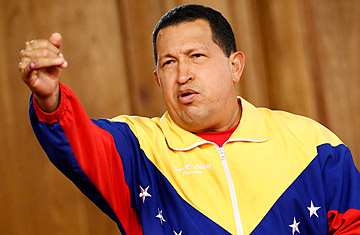
Venezuela's President Hugo Chavez arrives for a news conference at Miraflores Palace in Caracas, Venezuela.
Ever since he was first elected 12 years ago, Venezuelan President Hugo Chávez has been fortunate to face what is perhaps the western hemisphere's most incompetent political opposition. His opponents' most boneheaded move came in 2005, when they refused to take part in parliamentary elections. That handed Chávez a near rubber-stamp National Assembly, which he has used to further his "21st century socialism" agenda, consolidate control of the judiciary and hold a 2009 referendum that eliminated presidential term limits — even though voters had already rejected that constitutional change in a plebiscite two years earlier.
Fortunately for the opposition, something else has been growing in Venezuela besides Chávez's power — namely, voter dissatisfaction with his left-wing, anti-U.S. Bolivarian Revolution and its failure to rein in violent crime (the hemisphere's second highest murder rate) and inflation (30%). The bad news for Chávez is that the malaise coincides with signs that his opposition is getting its act together. That was apparent in Venezuela's Sept. 26 parliamentary elections, the first held since 2005, in which the Coalition for Democratic Unity (the Spanish acronym for which is MUD) and other anti-Chávez parties won 67 of 165 National Assembly seats. "It sent a clear message," argued Julio Borges, head of the conservative opposition party Primero Justicia, "that we don't want this government's radical path."
Chávez proved that he's still a popular figure in Venezuela, where his control of the hemisphere's largest oil reserves has helped him reduce poverty and enfranchise large swaths of the population once ignored by the country's corrupt elite. "The revolutionary forces won a very important victory," Chávez insisted. But although the apportionment rules his supporters recently rammed through ended up giving his United Socialist Party (PSUV) 98 seats, he essentially split the popular vote with the opposition, which claims that it got 52%. (Chávez says it only got 49.5%; a final official tally has yet to be announced.) Either way, the MUD's solid showing thwarted a two-thirds seat majority for the PSUV, which will prevent Chávez from ruling as peremptorily as his critics charge he has the past five years. "He can't pass all the laws now that he wants to pass because we've given him an obstacle, a stumbling block," says retired transport worker Jorge Salas, 62, an opposition backer.
But can the opposition stand in Chávez's way in the more important 2012 presidential election? The parliamentary vote created "a fundamental change," says political analyst Luis Vicente León of the Caracas polling firm Datanálisis. "We don't know if Chávez is defeatable [in 2012], but it's [now] a possibility." Still woefully absent are viable challengers — though many of them can't run because of a dubious law that disqualifies anyone who has even been investigated for corruption. "The opposition's challenge now is to identify a candidate they can rally around," says Michael Shifter, president of the Inter-American Dialogue in Washington, D.C. "And they better get that process under way right now."
Meanwhile, many fear that between now and January, when the new National Assembly convenes, Chávez will concoct measures to weaken Venezuela's legislative branch and give the executive even more bullying muscle. It's not an unfounded concern. Although Chávez isn't quite the dictator his foes claim he is, he's not quite the democrat his fans think he is either. To his credit, he holds democratic elections, but he's famous for finding ways to nullify their adverse results. The presidential-term-limits question was one example; he offered another last year when, after an opposition candidate was elected mayor of the capital, Caracas, the National Assembly passed a law that all but eliminated that office and replaced it with an administrator chosen by Chávez.
But if there is one message Chávez should glean from Sunday's results, it's that Venezuelans are probably as weary of those shenanigans as they are of their homicide and inflation statistics — and that continuing that political strategy between now and 2012 could undermine his re-election prospects, even if halting them risks improving the opposition's chances for an upset. Even so, few Venezuelan pundits believe that the opposition's Sunday victories will do much to diminish Chávez until then. "I really don't see [the parliamentary elections] as being a major factor," says Steve Ellner, political-science professor at the Universidad de Oriente and author of Rethinking Venezuelan Politics: Class, Conflict and the Chávez Phenomenon. "Chávez is [still] firmly in control between now and 2012."
Perhaps, but Chávez's own big challenge over the next two years is to dispel the notion that he simply can't solve Venezuela's crime and economic crises. Ordering newspapers and television networks to stop running grisly murder-victim photos won't stop the country's relentless bloodshed — a killing every hour and a half in Caracas last year — nor has nationalizing industries alleviated sporadic food shortages. Demonizing the U.S. and the "bourgeoisie" at every turn is no substitute for policy either. But the opposition "needs to do a much better job than it's done so far of offering its own pragmatic ideas," says Shifter. "Right now, in terms of a presidential election, it hasn't presented alternatives that the regular public can connect to."
Perhaps it can start honing those political skills again now that it's back in the National Assembly — and help Venezuela become a less dangerously polarized society. If Chávez's opponents accuse him of executive fiat, they now need to resist the equally harmful temptation to create legislative paralysis. "I hope we have some high-quality debates" in the National Assembly, says Rafael Hernández, 49, an accountant who backed the PSUV. But he hopes the opposition doesn't "block laws solely out of hatred" for Chávez. After the past five years, both Chávez and his opposition could stand to be reminded that true democracy involves compromise.
